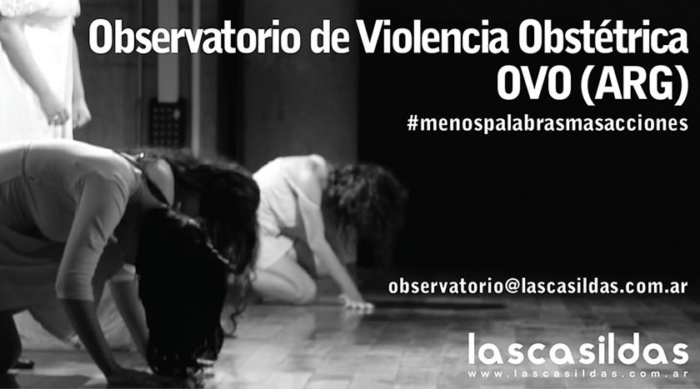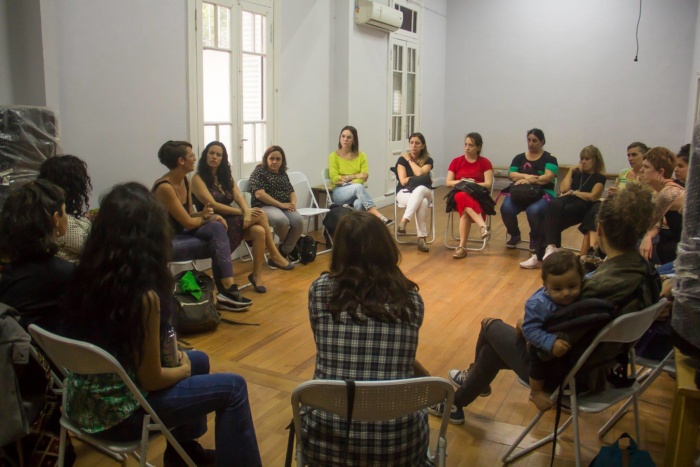Women in Argentina have recently celebrated progress in women’s reproductive rights with the historic vote in the Senate approving the legalisation of abortion but other struggles for women’s rights to control their own bodies continue. The physical and psychological abuse of pregnant women and the violation of their maternity rights has recently been exposed by a woman in Argentina who is taking her case against the State to the UN Committee on the Status of Women (CEDAW).
‘I was having a normal pregnancy, but at the clinic I was given a date to come in to give birth by induction. This was so the midwives and doctors could fit me into their schedule and not because it was necessary. In the weeks leading up they made me go to the clinic frequently to monitor the foetal development, so they could charge me more.
‘On the day I was due to give birth they wanted to hurry my labour along, so they tried to puncture the embryonic sac to speed it up and the midwife was pushing on my abdomen. In the process my pelvis was fractured, it was agony – three years later I am still having rehabilitation for my pelvis and hips and counselling for the trauma.
‘After giving birth I thought, I am never going to have another child – this is torture, and I am reminded of it on each of my son’s birthdays! My son was also damaged as during the birth they broke his collarbone. He is nearly three years old – born in February 2018 – and still doesn’t speak. He has very impulsive behaviour and we are monitoring his development.’
Maria (not her real name) explained in our interview that obstetric violence is a hidden practice and is widespread both in private clinics and state maternity wards in Argentina. She is a psychologist and used to work in the health service, but since her experience she’s resigned from her job and now works in a private practice because she does not want to be part of a system that abuses women.
‘Although there are protocols and regulations that are meant to protect pregnant women’s rights, these are not respected in practice. Expectant mothers have to sign a form to say that they’ll accept the maternity plan they are given, and so the clinic absolves itself of any responsibility if things go wrong.’
Maria began searching on the internet to find out if her experience was unique or if other women had similar stories. She found an organisation called Las Casildas, set up in 2011, which is campaigning to support women’s reproductive and sexual rights, and identified obstetric violence as an important issue for many women. Through Las Casildas she made contact with other mothers who also experienced medical abuse during their pregnancy and childbirth.
‘I went to a private hospital in Buenos Aires but have been in touch with women who went to public hospitals and were verbally abused, intimidated and treated very badly there, it is common practice in the health system. One friend was tied up because she was shaking so badly, terrified, and then they forced her to have a Caesarean. Of course, the clinic denies everything.’
Las Casildas set up the First Observatory of Obstetric Violence in the country in 2015, with the aim of collecting and analysing data and carrying out research; following up women’s cases and making official complaints; monitoring public policies and the implementation of laws; putting forward policy proposals to remedy this situation; and supporting the actions by other groups on this issue.
They define obstetric violence as acts of physical, emotional, and psychological torture, a cultural and political issue that reflects the subordinate position of women, and especially of mothers in society. Obstetric violence should be considered within the framework of sexual and reproductive rights and not as a medical matter. Childbirth is a biological fact and is affected by taking away women’s right to choose how to give birth and their independence in decision making.
The Observatory’s first report was based on a survey of almost 5,000 women in Argentina on their experiences of childbirth and found that a high percentage had given birth in a hostile environment and were very unhappy with the way they were treated. Women reported their experience of childbirth as a nightmare – some as ‘the worst day of their lives’ – which had affected both their own health and mother-child bonding. This report documents a whole list of complaints: from the patronising attitudes of the medical staff toward them, leaving them feeling infantilised; being forced into having Caesarean sections and treatments they did not want; not being allowed to get up and move around the room during labour – in some cases being tied down; and their partners or another person not being allowed to be with them during childbirth, among many other complaints.

This kind of treatment of pregnant women is not confined to Argentina: there is a Latin American Network investigating similar complaints in other countries in the region.
In Maria’s case, she tried to get justice from the Argentine state presenting formal complaints to different official bodies and government departments: ‘They sent me from one place to another and I didn’t get very far. The clinic put up a team of lawyers who denied everything and I couldn’t find a lawyer to defend me or the money to pay for one.’
Maria decided to make her experience visible in order to highlight the issue, protect other vulnerable women and to push for a guarantee from the State that existing protocols will be respected in practice to ensure these types of violations are not repeated. As she had exhausted all legal channels in Argentina, with the support of Las Casildas and a human rights organisation called Justicia y Reparación which specialises in human rights and international litigations, they launched a press release stating that a compensation claim for obstetric violence had been presented to the committee of CEDAW(Committee on the Elimination of Discrimination against Women) of the United Nations on 24 November, 2020.
This claim was made because Maria was unable to get justice in her own country. It is the first case of its kind in Argentina to be taken to the UN. There is a process available for women to make complaints and get economic compensation from their government, and the hope is that CEDAW will also investigate in other countries. They are asking the UN to find ways to resolve cases where there are health issues and damage to the newly born because of the treatment of women during their pregnancy and in giving birth.

Induced labour and unnecessary C-sections are part of medical practices and the health system needs to address these – starting in medical school, by training medical students, nurses, and midwives to respect maternity rights and being respectful of women’s wishes. Maria ended the interview by stressing that:
‘Maternity wards should be a safe space, and our birth plans and the timing of the birth should be respected without violence. Women find it hard to talk about these matters but when we did, we discovered that we had all been badly treated, we were not given information and there was medical malpractice’.
CEDAW have sent her confirmation of receipt of her petition and have given her a case number. They have also informed the Argentine State of the complaint, which has until November 2021 to respond. So now it is a question of waiting for the outcome.
Further information available from:
Las Casildas: https://lascasildas.com.ar/index.html
Justicia y Reparación: https://www.justiciayreparacion.org
Research Report: Observatorio Argentina, octubre 2015 https://drive.google.com/file/d/0B-ucL20WyuYRYTRZWThPcWVyY1U/view




